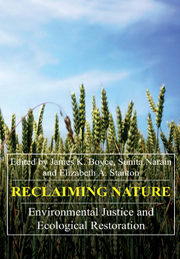Book contents
- Frontmatter
- Contents
- List of Figures and Tables
- Acknowledgements
- Introduction
- Part I ADDING VALUE
- Part II DEMOCRATIZING ACCESS
- Part III CAPTURING BENEFITS
- 9 Compensation for Environmental Services and Rural Communities: Lessons from the Americas
- 10 Certification Systems as Tools for Natural Asset Building
- 11 Wastes as Assets: Limits and Potentials
- 12 Community Rights and Wildlife Stewardship: Zimbabwe's CAMPFIRE Programme
- Part IV DEFENDING THE COMMONS
- About the Contributors
- Index
9 - Compensation for Environmental Services and Rural Communities: Lessons from the Americas
from Part III - CAPTURING BENEFITS
Published online by Cambridge University Press: 05 March 2012
- Frontmatter
- Contents
- List of Figures and Tables
- Acknowledgements
- Introduction
- Part I ADDING VALUE
- Part II DEMOCRATIZING ACCESS
- Part III CAPTURING BENEFITS
- 9 Compensation for Environmental Services and Rural Communities: Lessons from the Americas
- 10 Certification Systems as Tools for Natural Asset Building
- 11 Wastes as Assets: Limits and Potentials
- 12 Community Rights and Wildlife Stewardship: Zimbabwe's CAMPFIRE Programme
- Part IV DEFENDING THE COMMONS
- About the Contributors
- Index
Summary
Introduction
The degradation of the world's ecosystems is undermining their capacity to provide environmental services that are vital to humankind. This has fuelled experimentation with compensation schemes that reward people for managing ecosystems to provide environmental services, based on the premise that positive incentives can lead to changes in land-use practices. In the Americas, such experiments have concentrated on watershed management for hydrological services and on conservation of biodiversity and scenic beauty. If and when international negotiations yield a suitable framework for climate change mitigation, carbon dioxide sequestration could be added to the mix.
The prevailing approach to compensation has focused on payments, rather than other possible rewards such as greater provision of local public goods or enhanced social status. In many cases, payment for environmental services (PES) schemes have been characterized by designs that seek the lowest cost possible for achieving environmental goals; concentrate on single environmental services (such as carbon sequestration), sometimes at the expense of other ecosystem services; and accord priority to simplified, largescale ecosystems, preferably controlled by a few people, so as to reduce transaction costs.
This approach can have adverse — even devastating — impacts on poor and marginalized rural communities. At the same time, it misses opportunities for tapping into the crucial roles that these communities often play in ecosystem stewardship and the provision of environmental services. When poor communities hold secure rights over lands that provide environmental services, they are most likely to benefit from compensation schemes, and the goals of environmental protection and poverty reduction are mutually supporting. More often, however, community rights to natural resources are limited and insecure.
- Type
- Chapter
- Information
- Reclaiming NatureEnvironmental Justice and Ecological Restoration, pp. 237 - 258Publisher: Anthem PressPrint publication year: 2007



